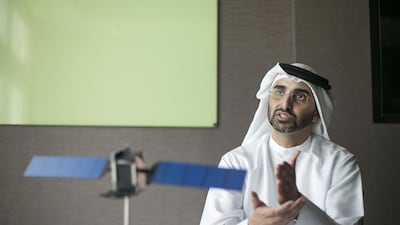The UAE satellite operator Yahsat, a unit of Abu Dhabi's Mubadala Investment Company, forecasts strong demand for its in-flight Wi-Fi service from low-cost carriers seeking to maximise revenues, and e-commerce firms offering deals to passengers, its chief executive said.
"Naturally, I would expect the low-cost carriers would be the ones who came to us as it makes sense for them not to invest hundreds of millions of dollars in an IFE [in-flight entertainment] system," the Yahsat chief executive Masood Sharif Mahmood told The National.
He said Yahsat had held talks with executives from Sharjah-based Air Arabia during the Dubai Airshow last week and, while the company is yet to meet the low-cost airline Flydubai, “we are excited and eager to open dialogue with them, it would make sense”.
In-flight Wi-Fi offers benefits for the region’s expanding e-commerce sector, too. “Imagine the revenue-generating possibilities for airlines and retailers, for Amazon or [the UAE shopping site] noon.com. Look at how many people are travelling in the sky; in terms of retail, these guys are being served by [Duty Free] trolleys being pushed down the aisle, which is Stone Age.
“Imagine the tie-ups that could be formed, the possibilities for air passengers to pre-order after boarding and get [their purchase] delivered at the end of their journey. We could have a global chain of retail.”
Mr Mahmood said Yahsat had yet to hold talks with noon.com but added “definitely this is a conversation we know airlines are keen to engage in”.
Yahsat last month trialled a 50Mbps (megabits per second) in-flight broadband connection that it claims will “change the way passengers experience air travel across the world”.
_______________
Read more:
Emirates Airline extends Wi-Fi to nearly half its fleet
Superfast internet service coming to Etihad flights
Satellite operator Yahsat in demand and plans expansion
_______________
The trial, conducted on a testbed Airbus A320 in partnership with Etihad Airways Engineering, part of Abu Dhabi’s state carrier, and other partners, achieved 50Mbps speeds using Yahsat’s Al Yah 2 satellite, and Mr Mahmood said faster speeds could be achieved once Yahsat’s third satellite comes online in January.
Under the plans, Yahsat’s Wi-Fi will be rolled out on Etihad flights from either the end of 2018 or mid-2019, subject to official certification. The process takes between 12 and 18 months.
“We know the technology works and are happy with its performance,” Mr Mahmood said. “We are aspiring to get ‘gate-to-gate’ certification, which means from the moment you step into the gate you are connected, while ascending, throughout the flight and descending, you can access social media, conduct business and interact with your loved ones.”
On-board Wi-Fi is typically not gate-to-gate at present – the plane has to ascend to 20,000 feet before it can be switched on. Yahsat's service will be a “step change” for the aviation industry, with the potential to improve passenger experience, boost airline revenues and ramp up aviation security.
Yahsat estimates the downtime loss for aircraft during periods of inactivity is US$100,000 to $150,000 per day. “A lot of the time, planes are on the ground not serving customers. And a lot of that time is spend on non-critical activities,” the chief executive said.
“For example, IFE content is loaded on a plane server ahead of the flight and that takes time. Imagine if I can do an upload mid-air. You no longer need to stop the plane for three hours.” If there are delays, he added, the airline can be selling online to its customers. “You are talking about huge efficiencies and optimisation.”
Meanwhile, a continuous Wi-Fi connection, kept separate from the aircraft’s flight control system for security, allows for live beaming of flight data to the ground, removing the need for an emergency black box.
Mr Mahmood declined to reveal costs, and said it was up to the airlines what they charge, but noted research had shown passengers were willing to pay between $5 and $9 for a three-hour flight to get good connectivity – “an encouraging sign for the whole ecosystem”.
Research in September by the satellite provider Inmarsat forecast in-flight broadband would be a $130 billion global market by 2035.
“The skies are the last mile that aren’t connected and we are going to play a key role in changing this”, Mr Mahmood said.

